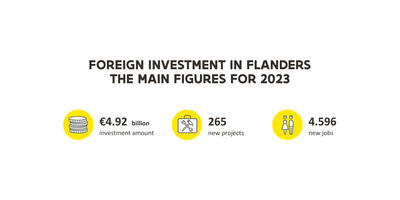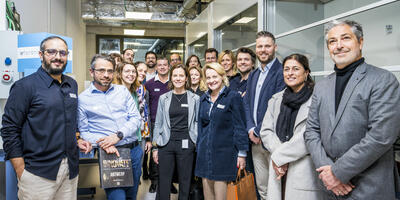
Gilead (US) licenses RSV inhibitor developed in Flanders

Candidate virus inhibitor
Respiratory syncytial virus (RSV) causes an infection of the respiratory tract. It is common in infants but can occur at all ages. In children younger than five, it is the leading cause of hospitalization for respiratory problems. But the virus can also make people with weakened immune systems and the elderly seriously ill.
In recent years, two institutions associated with Leuven University (KU Leuven) in Flanders have jointly developed a candidate virus inhibitor against RSV. This project succeeded with, among others, the financial support of the Wellcome Trust, a British charity. The research institutes involved were the Rega Institute for Medical Research and the Center for Drug Design and Discovery (CD3).
CD3, which is part of KU Leuven Research & Development, is an investment fund and center of expertise in drug development. Among other assets, it houses a “library” of hundreds of thousands of molecules, which are screened to discover potential starting points for drug development.
A vital deal
Both CD3 and the Rega Institute for Medical Research have now concluded a collaboration and licensing agreement with Gilead Sciences (US), known in Flanders as the commercial partner of the Mechelen-based company Galapagos, which is one of Flanders’ most prominent biotech pioneers.
Through the new deal, Gilead Sciences will receive exclusive worldwide rights to further develop the RSV inhibitors, while KU Leuven will receive milestone payments as well as royalties on sales once the inhibitors reach the market.
Strong preclinical results
The candidate RSV inhibitor developed in Leuven aims at slowing down the infection in sick patients by very specifically paralyzing virus replication and sparing human cells. “In a lab environment, the inhibitor has already produced strong preclinical results, both with RSV-infected cells and laboratory animals,” says Rega Institute virologist Johan Neyts, one of the brains behind the development.
We need a large and experienced company like Gilead to further develop our candidate treatment toward clinical trials. We can't put a timing on it yet, but we hope to start as soon as possible.
There is no RSV vaccine yet, although people have been looking for one since the 1970s. An antiviral drug that can inhibit the disease does not yet exist either. “In other words, the need is high,” Neyts concludes.
Flanders’ life sciences & health ecosystem
The Rega Institute, Galapagos and CD3 are just three of the many, cutting-edge organizations and companies that make up Flanders’ diverse and innovation-driven ecosystem for life sciences & health research and business.
Want to unravel this ecosystem in a virtual yet interactive way? Head to the Flanders360 platform and discover hundreds of successful companies, universities, R&D centers, incubators and other life sciences & health industry players in Flanders.
Alternatively, check out our industry overview to learn more about the available tax, legal and other incentives for establishing your life sciences & health hub in Flanders.


